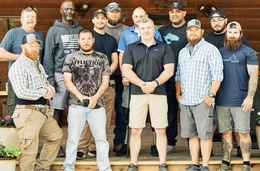
The men and women who risk their lives for our country are an integral part of the community; however, they face many challenges when they return home from service, and can feel isolated from society. In South Jersey, there are several local nonprofit organizations that help veterans to reacclimate, as well as to celebrate their heroism during and after service. Each organization has its own niche that contributes to one, unified message of education, understanding and serving those who have served the United States. It is also easy to get involved.
The Bar X Project
With a similar focus on veterans’ mental health, The Bar X Project organizes reunification trips to Montana. “There’s a lot of healing power in nature,” says James Moran, executive director and a former Marine.
“Our mission was to unite post-9/11 Marines and Navy Corpsmen with their former units, with guys that they served with overseas in combat, in order to reestablish that special bond that gets forged when you’re in combat, and to help equip them for personal professional success,” Moran says. “There’s obviously a major issue with the veteran suicide epidemic that’s going on. It’s not so much in the news anymore as it was, but it’s still going on. … I think the latest VA report that I read [said] 17.6 a day are still committing suicide, which is far higher than their civilian counterparts.”
In addition to helping veterans transition to civilian life, The Bar X Project works to eliminate the stigma of PTSD. Veterans hesitate to open up to others, further promoting isolation. “But they do come forward amongst their buddies,” says Moran. The retreats are completely volunteer-run and organized with donations.
Operation Yellow Ribbon
Regardless of one’s stance on global conflict and the U.S. military, some things are undeniable. Military service members decide to join for a number of reasons, including education benefits and new opportunities. Unfortunately, veterans do not always receive post-service support from the government or from their communities. These are all-too-common occurrences that Dave Silver, the founder of Operation Yellow Ribbon, speaks about with the utmost empathy and passion.
“Most of them are kids or young adults and have babies, are just getting married, and they’re coming back with limbs missing or not coming back at all. Their wives are home having a baby while they’re deployed and I just wanted to do something. I was mad at myself, because I was taking my life and my freedom for granted and just complaining about my electric bill. … I needed to channel that energy, whether it was negative energy or positive energy, and do something to give back, and I found something here in Marlton,” Silver says. “Just be pro-human and pro-people, because either way they’re doing us a service, whether we agree with it or not. So it’s our job to serve those who serve.”
Operation Yellow Ribbon first began as a private group organized by the parents of a man deployed in Iraq. After helping them for a few years, Silver took over when they retired. Through Operation Yellow Ribbon, he helps to organize care packages for service members who are abroad, and “rock-star escorts” for those who have returned home. These high-energy celebrations include cheering crowds, motorcycles, and are decorated, of course, with yellow ribbons everywhere. Monetary donations are accepted through their website, or at local checkouts of businesses partnered with Operation Yellow Ribbon.
There is also a wish list of requested items, and they’re not always what one would expect. Most importantly, feminine products for women overseas are a vital donation. Sometimes, service members want a bit of happiness in the form of something that reminds them of home. One example Silver shares was a request for Tastykakes that caused a bonding moment between units. However, healthy foods are still majorly sought after as well, depending on the individual.
Another way to help is to use connections that are already developed, such as organizing a partnership with a local school to send letters, to raise funds and supplies, or to organize a welcome-home celebration. If there are personal connections with a company that wants to donate a charitable supply of product, those partnerships are welcomed as well.
Project Refit
James Corbett co-founded Project Refit, another organization that encourages utilizing established resources, from an entrepreneurial standpoint created to help others. With a focus on mental health struggles that veterans face, Project Refit’s mission is “to combat isolation,” Corbett says. Although it is common knowledge that veterans are susceptible to post-traumatic stress disorder (PTSD), it is not widely understood what PTSD can look like, or the effects it can have on a person.
Upon returning to society, veterans can feel disconnected—further leading to a lack of trust, especially after seeing “the worst of the worst of the human race,” Corbett says. Ultimately, no one can understand the unique trauma that a veteran has faced unless facing it themselves. However, the community can combat this stigma with education and by demonstrating empathy to those with unimaginable suffering. Project Refit’s mission is to show them that they are not alone, as they work to prevent the devastatingly high suicide rates among veterans.
Project Refit organizes retreats and fireside chats to help military members connect with one another and the community, providing a therapeutic space in nature to decompress. “[We] do an activity [and] … get food, get lodging, have transportation and then get them around a fire together for the weekend and just talk to each other and reignite that friendship, reignite that community, reignite that connection, because they need that. And again, it’s all about showing up. Like, we have to be there for them. We have to be there for the veterans and the first responders to effect change,” Corbett says.
Forgotten Angels
Just as nature may provide healing, so will animals—particularly horses, at this South Jersey organization. At Forgotten Angels Equine Rescue, horses with PTSD bond with veterans in a three-week program with licensed therapists. The horses are rescued from slaughter and abusive situations, and are chosen by groups of four veterans at a time. Often, though, the connection between them is mutual, and they choose one another.
“They actually cry when they’re with the horses, because it gives them so much relief, which is amazing. And they realize that the horses were saved from bad situations and they relate to the horses,” says Darlene Supnick, co-founder of Forgotten Angels.
Supnick wanted to help veterans, as her father was a veteran. In addition to providing love and care to horses in need, Forgotten Angels provides veterans with peace and catharsis. “[One female veteran] said she hadn’t had a peaceful day in seven years, until she went to the horse therapy,” Supnick says.
South Jersey Honor Flight
While a focus on healing a veteran’s past and helping them to function in the present are essential, so is a veteran’s legacy. One of 126 hubs nationally, South Jersey Honor Flight organizes trips to Washington, D.C., for New Jersey veterans to see their memorials. They travel on a bus from different pickup locations across the state, and are accompanied by a child, grandchild or volunteer, known as “guardians.” Starting with the World War II Memorial and honoring veterans throughout history, predominantly Vietnam and Korean veterans, two trips are organized each year with approximately 100 veterans and 50 guardians each. The trip is free to veterans, and each veteran can only go once.
Some of the veterans who participate in Honor Flight are terminally ill, which designates a certain urgency to allow them to witness their impact before it’s too late. Once given medical clearance by a doctor, terminally ill veterans are prioritized and health accommodations are administered throughout the trip by a caretaker. Pam Pontano, organizer of South Jersey Honor Flight, has witnessed the incredible impact that the trips have upon veterans.
“We had a daughter bring her dad and [he] was dying. He had a brain tumor, and he had a very short time left to live and he wanted to visit his memorial. He’d heard about it and he wanted to be with his brothers and sisters in arms and he had a wonderful day. And he passed away about two weeks after the trip. We went to his funeral and his daughter said, ‘That was the highlight of my dad's life.’ He was so excited because it didn’t have anything to do with him being sick. It had everything to do with him being with other vets,” Pontano says.
As a former special needs teacher at Williamstown High School, Pontano also organizes donations, mail and celebrations with schools. Volunteers are continuously welcome, as South Jersey Honor Flight has given back to 1,760 veterans and counting.












